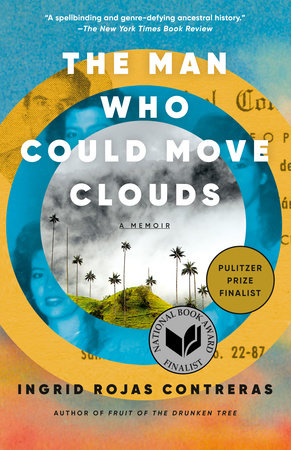The Man Who Could Move Clouds Reader’s Guide
By Ingrid Rojas Contreras


1. In light of Ingrid’s ongoing relationship with amnesia, how does memory and remembrance function in the book? What does it mean to be in a constant state of remembering and forgetting? What do we gain and what is lost when we forget or lose our memory?
2. Ingrid traces Colombia’s history of colonization and the ongoing effects of being colonized. What does it mean to survive colonization while also still living despite continued acts of erasure? In what ways does Ingrid’s book serve as a memorial and/or historical document of what was lost?
3. Throughout the book Ingrid recounts several traumatic events – her mother’s first marriage, their migration to America, etc. What are the ethics of writing trauma? What is our role as readers who consume it? How does Ingrid write about trauma and its survivors that differs from other books you might have read?
4. Ingrid writes, “Magical realism was just realism to us.” How would you describe The Man Who Could Move Clouds if you cannot use the words “magical realism”? In what ways has her memoir challenged your ideas of what realism is and what realism can be? What other books have you read that were deemed as “magical realism” and try to use different words to describe those books.
5. In the many reviews of this book, much has been said about the use of ghosts, mysticism and divination to write not only her family history but also that of her native country, Colombia. How has this challenged your views of what a historical text can be or should be? In what ways has skepticism hindered your ability to read this book as realistic and true? Are there ways in which this story has expanded your understanding of historical events?
6. A major event in the book is when Ingrid’s mother and aunts collectively have a dream in which Ingrid’s grandfather asks them to be disinterred. There is much discussion among them about doing this illegal deed and why they cannot tell anyone outside of their circle. What are the ethics they encounter along the way? Would you be able to do something that questions your idea of ethics for your ancestor? One day we too will become ancestors. What makes a good ancestor?
7. Throughout the memoir we hear the refrain from Ingrid’s mother that we all just need “a new story” or that people don’t want to be told the truth— they want “a story.” Oftentimes this is recited when Ingrid prods her mother about how she diagnoses her patients. In what ways are storytellers and curanderos different? Are writers just another kind of curandero?
8. When Ingrid’s sister is ill, Ingrid has to translate not just the language for her mother but also translate Western medical practices and diagnosis. What does this scene reveal about how different cultures treat illness? What was different in the way Ingrid’s mother wanted to treat her daughter and how the American doctor wanted to treat her? In what ways were these approaches similar?
9. Ingrid’s mother initially didn’t want her to write this book and in fact Ingrid’s mother said she wouldn’t speak to Ingrid if she wrote it. In telling the story, however, there are moments in the book in which Ingrid does not reveal certain events. What is important to note about the stories we speak and the stories we hide? Is there a story in your family that no one speaks of? Maybe a relative you know nothing about? Who is it or what is that story? Is there a family member you can discuss this with?
10. The memoir’s epigraph is a line from a poem by Iranian-American poet Kaveh Akbar: “There is room in the language for being without language.” What does it mean to be without language? In what ways do the names we create for those outside of our culture or experience (i.e., magical realism) diminish others? What does it mean to be unnamed? Is there power in the unnamable as much as the named?
11. Photographs play a powerful medium in this memoir. In these photographs she recounts the ghosts within them and tells the story of what they immortalize on film. Is there a photo that always struck you as curious? Maybe a photo you were in love with because of the story that you had been told. What is your favorite photograph? Try and choose an old photo. How does this photo seem different to you after reading this book?
Just for joining you’ll get personalized recommendations on your dashboard daily and features only for members.
Find Out More Join Now Sign In